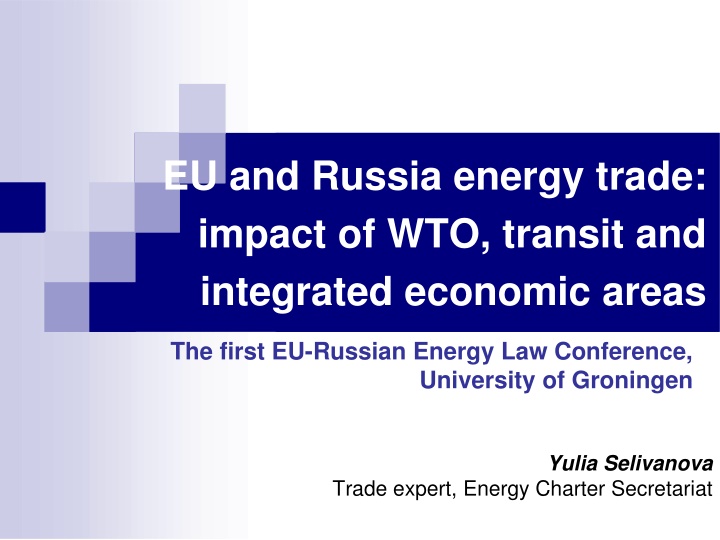
Impact of EU-Russia Energy Trade Regulations on Transit and WTO
Explore the impact of WTO regulations and transit issues on energy trade between the EU and Russia. Learn about regulatory challenges, differences in energy transit, and commitments under the Energy Charter. Discover how the WTO governs transit freedom, non-discrimination, and more in the context of energy trade.
Download Presentation

Please find below an Image/Link to download the presentation.
The content on the website is provided AS IS for your information and personal use only. It may not be sold, licensed, or shared on other websites without obtaining consent from the author. If you encounter any issues during the download, it is possible that the publisher has removed the file from their server.
You are allowed to download the files provided on this website for personal or commercial use, subject to the condition that they are used lawfully. All files are the property of their respective owners.
The content on the website is provided AS IS for your information and personal use only. It may not be sold, licensed, or shared on other websites without obtaining consent from the author.
E N D
Presentation Transcript
EU and Russia energy trade: impact of WTO, transit and integrated economic areas The first EU-Russian Energy Law Conference, University of Groningen Yulia Selivanova Trade expert, Energy Charter Secretariat
Issues How transit is regulated by WTO? What are the problematic issues in regulation of energy transit by general WTO rules? Transit under ECT multilateral investment treaty applying WTO rules with respect to energy
How energy transit is different? Energy difficult to store => timing matters Reliance of energy trade on fixed infrastructure Conditions of access to infrastructure at right time important !!! Fixed infrastructure investment capital intensive Energy transportation is capacity restricted => Importance of investment framework Time aspect an energy transit dispute in a cold winter
Transit regulation by WTO GATT Art. V: - freedom of transit - non-discrimination - no unnecessary delays/restrictions - reasonable transit regulations - no rent seeking - reasonable, cost reflective charges BUT no rules for creation of transit infrastructure! Trade Facilitation negotiations focus on energy transit
Russias WTO accession commitments & transit General commitment to abide by Art. V GATT Customs Union (RF/BEL/KAZ) does not affect WTO commitments Customs procedures applicable to transit by pipeline No commitments similar to Ukraine s on pipeline transportation
Energy Charter Constituency importance of transit This map is without prejudice to the status of or sovereignty over any territory, to the delimitation of international frontiers and boundaries and to the name of any territory, city or area 8
Energy Transit: GATT V => ECT Article 7 => Draft Transit Protocol ECT Article 7: Freedom of energy transit Specifying GATT V for energy materials and products using fixed infrastructure Non-discrimination as to origin, destination, ownership or pricing Transit treated no less favourably than energy originating in or destined for transit country itself PLUS IMPORTANTLY No obstacles to the creation of new capacity Non-interruption of transit in case of dispute Dispute resolution procedures ECT Art. 27 / Draft Transit Protocol Art. 21 ECT Art. 7(7) (conciliation, party to dispute can invoke)
Energy Charters Transit Protocol negotiations Further elaborate and detail the ECT Article 7 Basic text agreed at the end of 2002: Definition of available capacity Principles of transit tariffication Transparent and non-discriminatory congestion management rules Detailed provisions for new capacity creation Remaining open issues were discussed in bilateral consultations between EU and Russia: Avoidance of mismatch between the duration of supply and transit contracts Application of the TP inside the EU
Impact of integrated economic areas on energy transportation and transit Formation of regional economic areas intensified Common rules for energy transportation & conditions of access to fixed infrastructure Is discrimination in favour of customs union members allowed? Economic integration should not increase restrictions! Are lower transit fees allowed?
Conclusions Energy transit is linked to investment rules! It is not only about non discriminatory access to transport infrastructure Possibility to create new transit capacity is most important Non interruption of existing transit WTO rules on transit are general and not designed to deal with energy transit problems! ECT contains investment rules important value added to WTO
